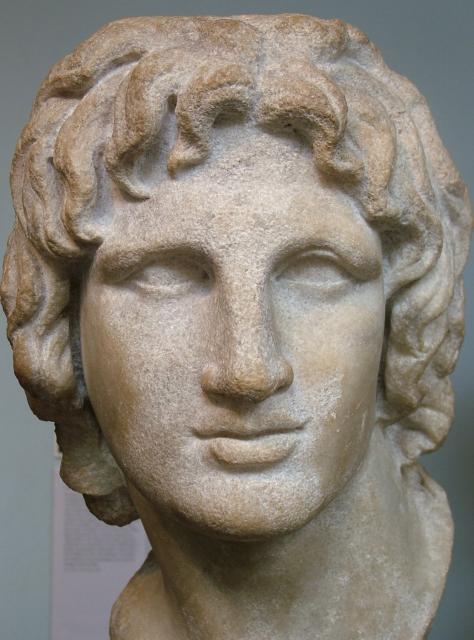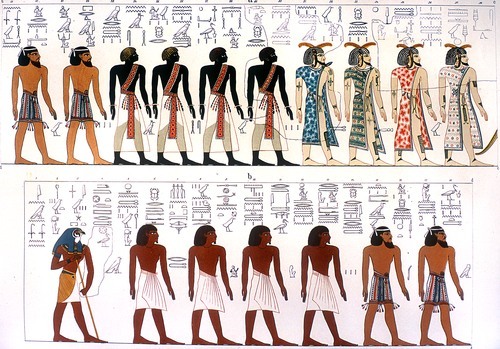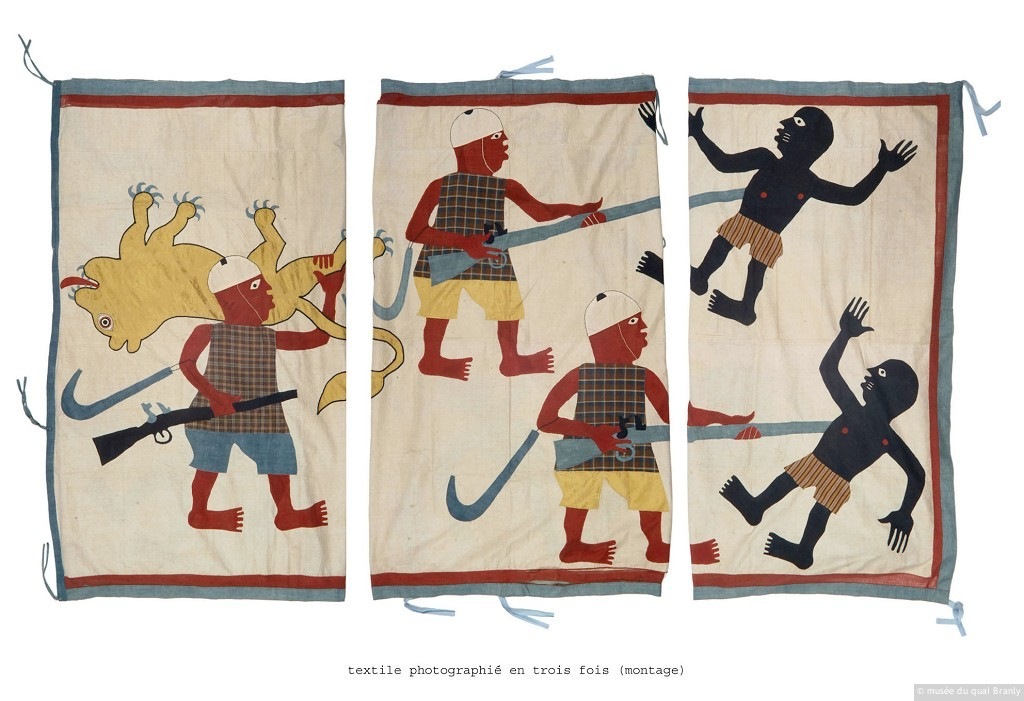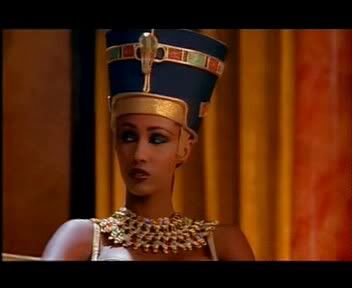Hello. This is my first post on the forum. I'm not particularly interested in this game however I would like to join the debate.....
Having African origins (which is indisputable) doesn't mean they were black though. Perhaps more importantly, ancient Egyptians didn't consider themselves Africans, nor Asians, They considered themselves something distinct and in between. Lastly, I don't know of any civilization that would depict its members in a skin colour that they didn't have. If ancient Egyptians were black, why would they consistently depict themselves as not being black? It simply makes no sense.
If you look at the "Mural of Races" from the Tomb of Seti I that Kahotep posted you see the the Ancient Egyptians depicted themselves as uniformly brown in contrast to lighter-skinned and dark-skinned neighbors. We know that the people south of Egypt in the Sudan were very dark and the people east and west of them were very light so it stands to reason that this was an attempt to portray realistic skintones and not symbolic.
Obviously Ancient Egyptian art was stylized. They did not have proper portraits and some of the art is obviously not realistic including skin color (ex. blue and green skin) however one observation that can easily be made is that medium or reddish brown was the shade the Ancient Egyptians chose for themselves in contrast to their neighbors. They did have a convention of depicting Egyptian men as brown and women as yellow however during the Amarna period both genders were painted as brown showing that the earlier difference in art was a convention.
This video shows a variety of Egyptian tomb paintings from different periods showing that most of the artwork depicted the Egyptians as brown:
Now what relevance does this have to whether the ancient Egyptians were Black? Dark-skinned Africans have a range of complexions from the very dark brown Sudanese, to the medium brown Somali and Ethiopians to the light brown Khoisan. Many Sub-Saharan African populations have dark brown skin. Black is a reference to their skin color which was very dark compared to Europeans who called them Black but no African population has literally jet black skin.
Now can you answer this question honestly. Looking at the skin tone from the art in the video and the mural which man is closer to the brown color the Ancient Egyptians chose for themselves?
This man?

Or this man?

Ancient Egyptians also sometimes appear as black or blue - symbolic of death and rebirth, and males were habitually portrayed darker skinned than females. I'm not sure what your point is. As already mentioned, they saw themselves as distinct from either black Africans or Asians (Asiatics, as they called them), as well as Libyans. Now, the latter two would have been completely redundant if ancient Egyptians were actually black.
Apart from that, not all black Africans are actually black. They range from dark brownish to indeed jet black. (Posting a picture of Barack Obama isn't really relevant here - except for the fact that he is 'black' because he is seen as black - so that is more about racism than skin pigmentation. He has also been called 'an Arab', so that doesn't help much either.)
The Ancient Egyptians didn't have a concept of "African" or "Asian."
They identified people by their nationality, language and culture and had their own words for these groups.
If the Ancient Egyptians depicted themselves as brown then why can't we consider that a clue as to what their actual complexion was? On a side note Obama being called an Arab was famously done during a Town Hall meeting with John McCain by an elderly White woman who said she read about him on the internet and didn't trust him because he was an Arab. This is obviously a racist statement rooted in Islamophobia and I believe the source of her accusation is an article I read which claimed Obama was an Arab-American because his ancestry legally made him so. This was a total and complete lie as Obama's father was a member of the Luo tribe in Kenya and had no known Arab ancestry. The article provided no sources and was clearly a deliberate attempt to spread rumors about Obama's ancestry to encourage racial hatred against him which was insulting to both Obama and real Arabs. As for Obama being called Black this is a tradition that is rooted in the American One Drop Rule which certainly has a racist origin but has been embraced by the African-American community because of the history of having partial Sub-Saharan African defining how people are labeled and treated (Dr. Martin Luther King Jr. and Malcolm X were fairly light-skinned themselves due to mixed ancestry even though both of their parents were African-Americans but if you tried to deny they were Black based on this most Americans would think you are crazy).
I believe Kahotep's point about Obama is that he has mixed ancestry but is considered to be Black yet he is lighter-skinned than the Ancient Egyptians' depictions of themselves. So why wouldn't the Ancient Egyptians fit in to the classification of Black going by Western standards?
Taking art at face value (never a good idea when unaware of how it is meant) and pointing to symbolic use of colours are two different things. I'm sure you can find a picture or two to substantiate your belief that ancient Egyptians were black. (As mentioned, that they were African in origin isn't really in dispute.) But once again, if they actually were black, shouldn't they at least acknowledge this themselves? We have no conclusive evidence for this - neither textual nor pictorial.
The pictorial evidence is substantial if you accept the reality that the Ancient Egyptians depicted themselves as brown-skinned in most of their art. The textual evidence may not be significant because the Ancient Egyptians did not have the modern concept of race we have today. They saw differences in skin color and facial features among other biological characteristics that everyone can readily observe but they didn't necessarily associate it with their or any group's identity. You can find translations of Ancient Egyptian text that appear to reference skin color depending on the translator but these translations are suspect given that modern scholars did not live during the time period of the Ancient Egyptians and didn't know the meaning of their language. The Ancient Egyptian language was considered dead for centuries until the discovery of the Rosetta Stone which helped scholars translate hieroglyphs using Ancient Greek text. The modern Coptic language is also a descendant of Ancient Egyptians but if you didn't grow up in the culture you don't exactly know what the meaning behind the text is.
A Senegalese scholar named Cheikh Anta Diop spent a great amount of time trying to prove the Black Egyptian hypothesis and claimed that the Ancient Egyptians referred to themselves as Black (Kmemou=Black people, Kmt nu = Black nation - the name of Ancient Egypt). Other scholars disagree and claim that Kmt refers to the black soil of the land not to the ancient Egyptians as Black people in a racial context.
I personally feel there isn't a definitive answer to this which is why I prefer to stick to the artistic and scientific evidence.
Yes. Only by that time a significant influx of Nubians would have taken place already. Ancient Egypt started roughly two millennia before anyone ever heard of Greek civilization. So 'ancient Greeks' is a bit relative in this case.
You could have mentioned an older external source though: the Bible. Very specific about black-coloured people, and especially Exodus is quite anti-Egyptian in its views. and yet, strangely, not a single mention of these New Kingdom Egyptians being darker skinned than the Hebrew authors.
I don't consider either the Ancient Greek text nor the Bible to be reliable either for the same reasons I gave about the Ancient Egyptian text. People living today did not grow up in those cultures and even though we have translations of ancient texts the context is often difficult to understand. Classical Greek civilization developed after native Ancient Egyptian civilization had already fell lasting for thousands of years. I consider the Bible to be a book of faith and religion that is not necessarily historically or factually accurate.
There are very few passages in the Bible that reference skin color at all and the Hebrew (assuming the story in The Book of Exodus is even true) would not necessarily have cared to make observations about the skin color of the Ancient Egyptians. The scripture by the way is less anti-Egyptian and more pro-Hebrew in that the Hebrew are portrayed as victims of an oppressive Pharaoh who had them enslaved when they came in to the land of Egypt although originally the Hebrew and Egyptians got along fine. The Egyptians are portrayed as harsh to the Hebrew and discriminated against them but this isn't exactly a derogatory portrayal taken at face value.
I should note that in the Table of Nations there are texts that suggest that the Ancient Egyptians were closely related to other African people as they are considered descendants of Ham however that tells us nothing about skin color.
Not really. What we have is genetic evidence that ancient Egyptians were closer to sub-Saharan Africans than to Mediterranean populations. Now, the interesting thing about that is the closer to. It's not the same as identical with. Since ancient (pre-)Egyptians would have come from the Sahara - not the Sudan or Somalia (the inhabitants of which they considered peculiar enough to send some specimens to pharaoh), that merely suggests the Sahara was populated from the south rather than the north.
The genetic and other biological evidence suggests that the Ancient Egyptians had close biological affinities to their more Southerly neighbors in Africa rather than Southern Europeans and Southwest Asians (so-called Mediterraneans). The Ancient Egyptian explorations in to interior Africa were primarily concentrated to a land called Punt which modern archeologists and historians believe was located around Somalia and Eritrea. What is interesting is that the Ancient Egyptians called this place "The Land of The Gods" and considered it their ancestral homeland. Many linguists postulate that Afroasiatic language family of which the Ancient Egyptian language forms its own branch along with Coptic (dubbed "Egyptian") originated in the Horn of Africa region. What the archeological and linguistic evidence indicates is that the ancestors of the Ancient Egyptians came to the Nile Valley from tropical East Africa which is consistent with the Ancient Egyptian's own historical records and biological evidence.
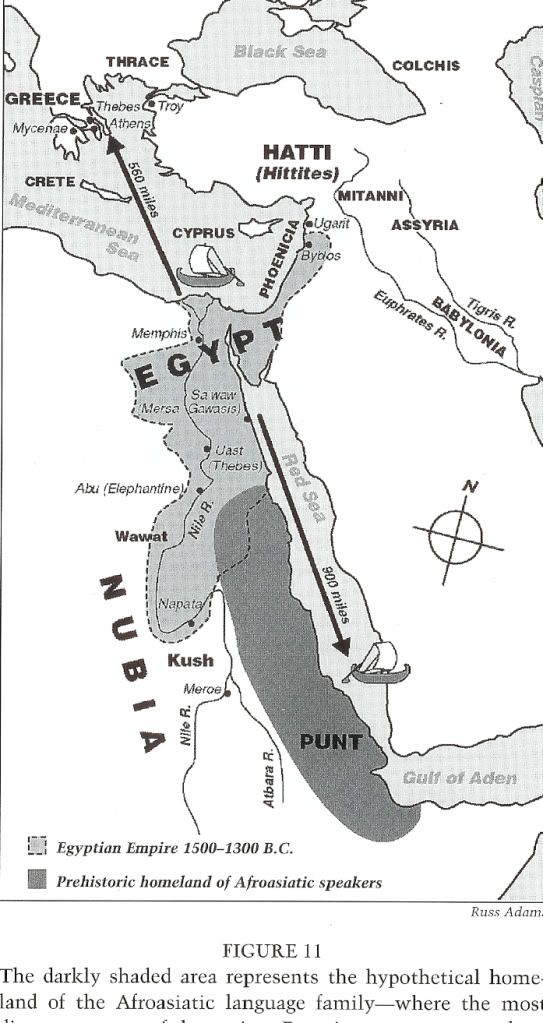
Biological affinities is a bit of a euphemism here. Ultimately, all humans are the same species. Geneticists estimate that at some point homo sapiens consisted of a mere 10,000 specimen. Isn't it wonderful we have gotten such diversity from that?
That's irrelevant to the point though. Yes, we are the same species however the term
biological affinity is used by Biological Anthropologists to make inferences about population relationships within the human species. In other words which populations were the Ancient Egyptians most biologically similar to among their neighbors? What physical characteristics did they have which differentiate them from other populations?
This term is preferred by many Anthropologists over traditional racial classification which relies on stereotyped thinking.
This is a good paper to read on the subject:
Title: Studies and Comments on Ancient Egyptian Biological Relationships
Journal: History in Africa Volume 20 January 1993, pp. 129-154
Download Link: https://mega.nz/#!XMN0wDZL!8-muaVuTg71a3oFC8ItYEHMeA6FZAoNzxHajzvPZsl0
No, it doesn't. What we know is that ancient Egypt was united from the south. Not that northern Egyptians are less Egyptian than southern Egyptians, which is, frankly, nonsensical..
I don't think that is what Kahotep is saying, only that the Northern Egyptians may have been more phenotypically diverse than the Southern Egyptians and that the architects of Ancient Egyptian civilization came from the South.
No, it's not.
So, summing up, you have a quote from a book published in 1998 as 'evidence' that ancient Egyptians were Africans. Interestingly, we already knew that. The claim that ancient Egyptians were 'of Sudanese or Somalian' descent suggests rather a lack of knowledge of the actual origins of the ancient Egyptian habitation pattern.
But hey, it's your mod. You can make as many 'African' civilizations as you like. Just keep in mind that the evidence for this Black Egypt myth is rather thin, to put it mildly.
I think you should read the paper for yourself. The evidence for the Ancient Egyptians having a strong biological connection to their neighbors to the South is substantial. If the date of those articles is considered to be too old for you you should know that Dr. Shomarka Keita was consulted by National Geographic Magazine around the time of the controversy surrounding the reconstruction of King Tut and gave the following statements in this video on race and genetics as it concerns the Ancient Egyptians.
He also gave a presentation at The University of Cambridge on the bio-cultural origins of Ancient Egypt which you can find segments of on Youtube.
I also spoke to Dr. Keita by email for clarification on his conclusions about what the Ancient Egyptians looked like. Here are some key quotes:
Shomarka Keita said:
Question: Were the Ancient Egyptians predominately dark-skinned throughout the Dynastic period and were they predominately African biologically (a pictorial reference to modern populations to illustrate what the majority looked like would be helpful)?
Keita: No one can say exactly what colour they were, but one might reasonably say that the typical Upper Egyptian to Nubian color would have been the modal colour in most of the country.
Shomarka Keita said:
Question: What is your basis for stating that the Ancient Egyptian statuary is "Somali-like" in appearance?
Keita: Best way to think of this is in terms of parallelism or microconvergent evolution. Somali males are predominantly of E group lineages; African in origin. Look for yourself at the Egyptian statuary for the architecture of faces if you trust the statuary, and look at Greek or Roman statuary. Go over the faces point by point, of course there is variability, but look for a distillation. Look at faces of Oromo, a range of Nilotic folk etc, and you might be able to see what I mean.
I think I see what he means. Do you?
King Tut Bust
 Somali Man
Somali Man
 Alexander the Great Bust
Alexander the Great Bust
